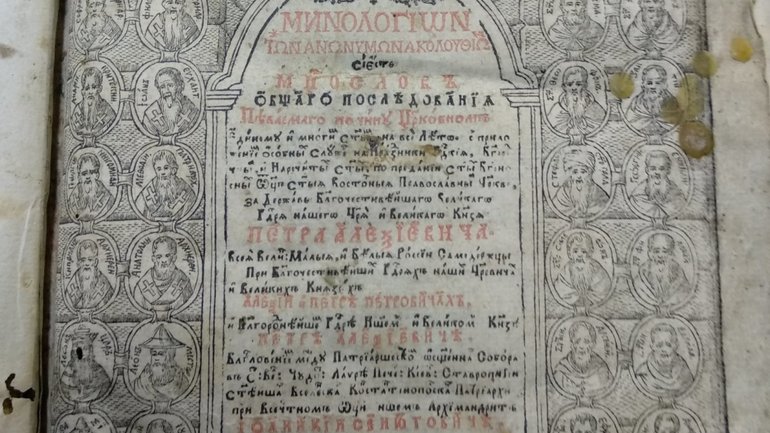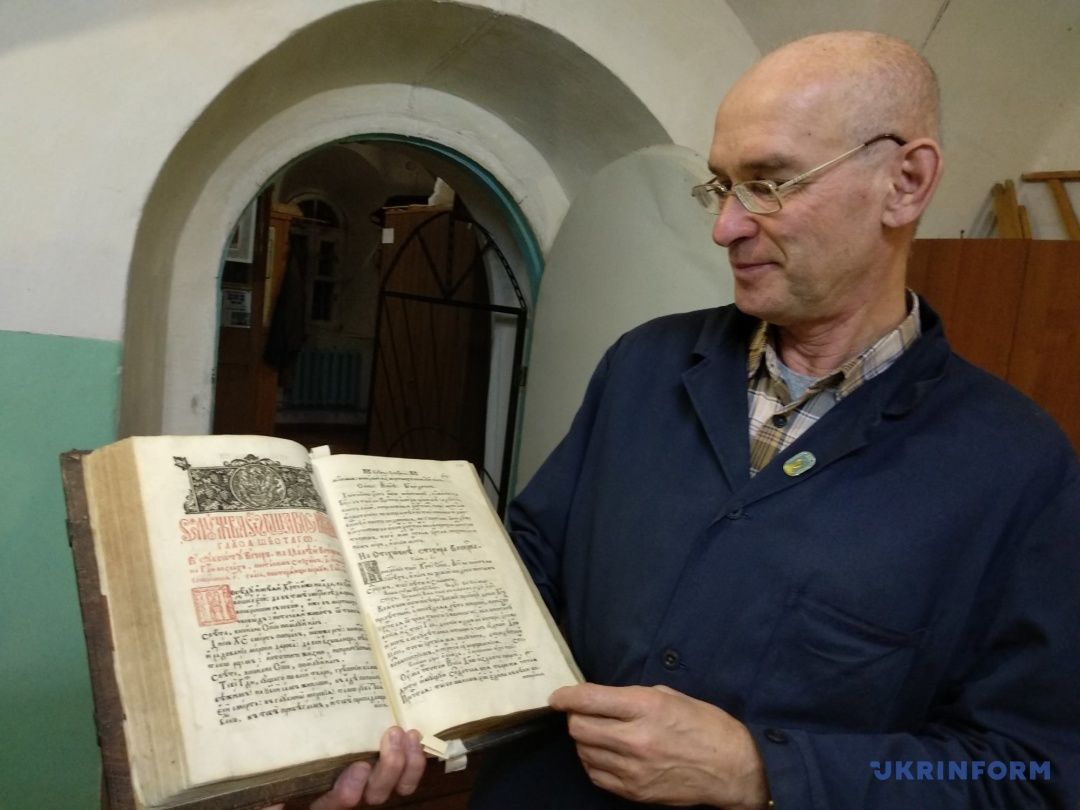Chernihiv stores evidence of the clergy's rejection of the decision to transfer the Church from Constantinople to Moscow

Igor Syty, Candidate of Historical Sciences, a senior research fellow at the museum, told Ukrinform a unique biography of this old printed book.
The historian began his story with a reminder of the events of the second half of the XVII century, when a Cossack state was formed on Ukrainian lands - the Zaporizhzhia Army or Hetmanate under the leadership of Bohdan Khmelnitsky after the uprising of 1648. The Church played a significant role in it, as it was the intellectual center of the whole society of that time.
According to the order of the Cossack state, the Hetman controlled not only secular, military and judicial cases, but also ecclesiastical ones. Therefore, when Khmelnytskyi made a deal with the Moscow Kingdom, the Ukrainian church was later transferred under Moscow's jurisdiction. This happened in 1685-1686 after Ecumenical Patriarch Dionysius IV, and the Holy Synod of the Church of Constantinople issued an act on the right to ordain the Metropolitan of Kyiv by the Moscow Patriarch. Although that document had a number of conditions, including that the Kyiv Metropolia should remain part of the Patriarchate of Constantinople, all of them were violated over time by Moscow, and as a result, the UOC completely changed its subordination.
The creation of the Union of the Cossack state with the Moscow Kingdom in Ukrainian society was perceived ambiguously.
In 1718, a few decades after these events, the Printing House of the Kyiv Pechersk Lavra published the book "Menologion". There would be nothing unusual in it, if not for the last lines of the title page, which sets out the summary of the publication. Since they are written in Church Slavonic, we will present them in the wording of Igor Syty.

"Блгсловеніем между Патриаршеством осщеннаго Собора въ Ст: Вел: Чудот: Лаврі Печер: Кіевс: Ставропигіи Стійшаго Вселенскаго Константінополскаго Патріархи при Всечстномъ Отци ншемъ Архімандриті ІОАНИКІИ СЄНЮТОВИЧІ. Тvпомъ Изданный. В Літо Біа Слова [року] А¸ИІ [1718] Іануарія КЗ [27]".
Formally, the Church has long been near Moscow, and the title of the book indicates that it is a stavropegia of the Ecumenical Patriarchate of Constantinople.
According to the historian, the edit was obviously made without permission by monks who worked in the printing house. A well-known Ukrainian public, political and church figure of the first half of the twentieth century, Ivan Ohienko, once wrote that, in his opinion, the inscription was corrected by the manager of the printing house, Father Tikhon. The Ukrainian clergy then knew well that the Kyiv Metropolia is older and higher in rank than the Moscow Patriarchate, that Kyiv is the "Mother of Russian cities", and did not agree with the position of the top leadership of the state and the Church.
So, in January 1718, "Menologion" was submitted to print with a changed title. And who knows how much it would have been unnoticed if it was not for the big fire in April of the same year in the Lavra (including the printing house). During the investigation, someone drew attention to this book - precisely to the discrepancy between its title and the officially approved subordination of the Kyiv Metropolia. A scandal broke out. When Peter I heard about it, he Tsar personally took control of it. Consequently, a decree was issued: all books should be withdrawn, the title corrected, and only then put on sale.
However, the monks of the Lavra replied that all the books were burned down and there was nothing left to correct. But that wasn't true. The printed edition went to the parishes even before the fire, including a copy that is now stored in Chernihiv.
"If Ivan Ohienko's assumption is true, then Father Tikhon took on a lot of responsibility and ran serious risks. As in those days, he could have been executed for such a thing. But they didn't punish him, because they didn't prove anything - one had to catch him red-handed first. However, I think, the Lavra knew who corrected the title, just covered up Tikhon and that's it," Igor Syty said.
According to him, the book was used in parishes for a long time. In other words, there was a de facto confirmation that the Ukrainian clergy considered their church to be higher in rank and not subordinate to the Moscow Patriarchate.
"Menologion" got to Chernihiv Museum from a church in Zhuklya village in 1962 under the tenure of Nikita Khrushchev - during the last stage of closing churches in the Soviet Union. In the museum, the book lay for a long time as an ordinary valuable old printed book. But recently, it "started talking" again.
"I paid attention to this book when the process of restoring the subordination of our Church to the Ecumenical Patriarchate began. Look: 1686 and 1718. So many years after the transfer of the Ukrainian church to Moscow, a book is published that says: "no! We are the stavropegia of the Ecumenical Patriarchate of Constantinople!". And "What is written with a pen cannot be cut with an axe." I think that most modern priests do not know about this fact. And in those days, in the XVIII-XIX centuries, churchmen watched, read and pretended that everything was normal," said Syty.
According to the scholar, this old printed book is unique, and its history reflects the general attitude of Ukrainians to what happened in their homeland. This, he has noted, is not an isolated example of preserving the truth, despite the terrible decrees issued from Moscow to destroy or hide it.
"Menologion" is a fairly large book - measuring 30.5 x 19 cm, 7 cm thick, weighing 3 kg and beautifully decorated. The frame is made of oak planks covered with leather. Overall, there are several such books in Ukraine, and they are kept, except for the Chernihiv Museum, in Kyiv libraries.









